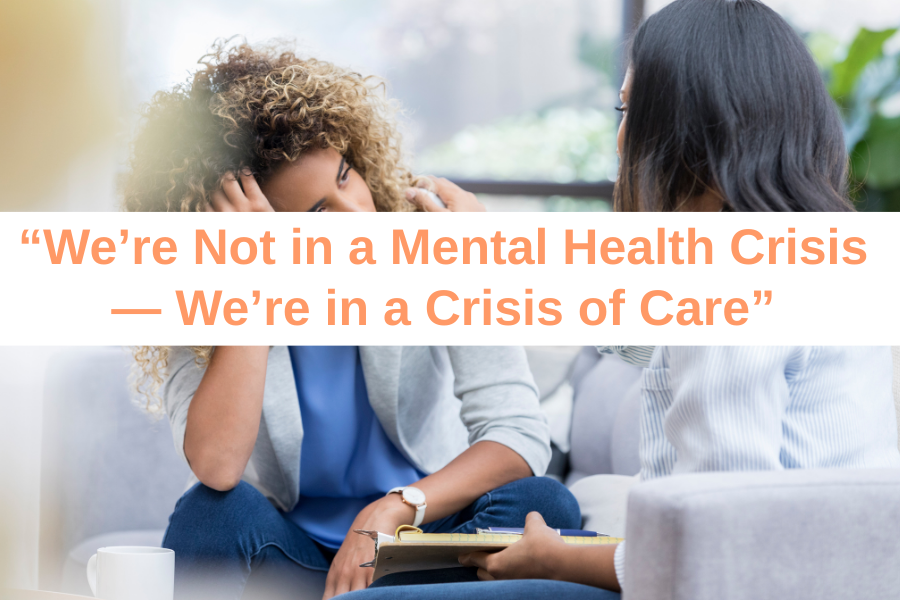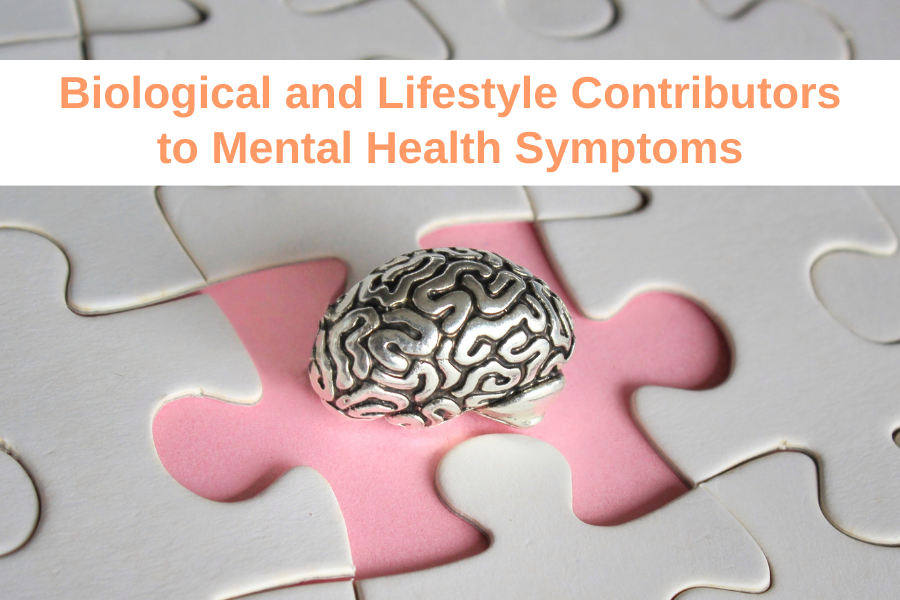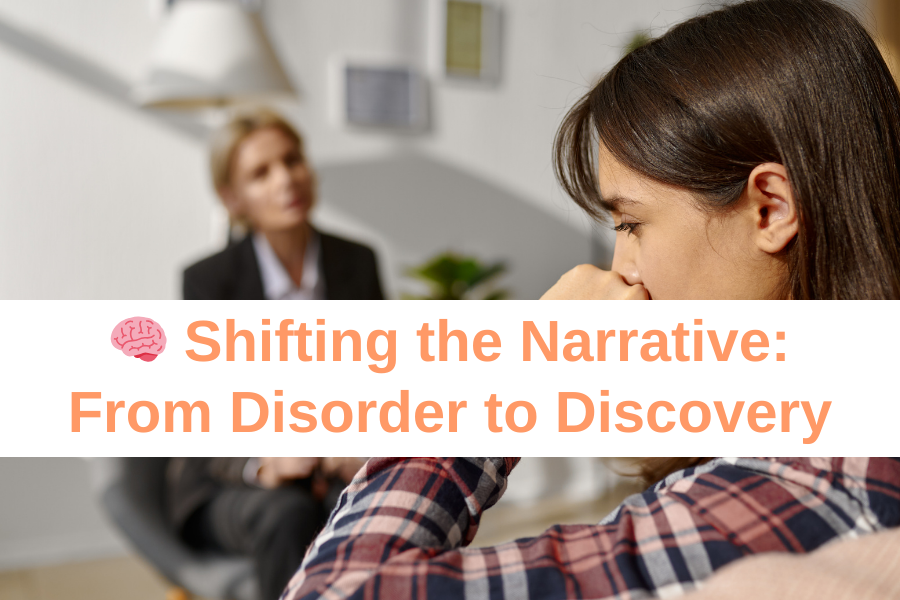In a powerful conversation between Dr. Mark Hyman and Functional Psychiatrist Dr. James Greenblatt, one truth came through loud and clear: what we’re facing isn’t just a mental health crisis — it’s a crisis of care.

For decades, we’ve accepted the narrative that mental illness stems from a chemical imbalance, one that can be quickly corrected with medication.
But what if depression, anxiety, ADHD, and even psychosis are symptoms of deeper imbalances, ones that can be tested, treated, and even reversed without automatically reaching for a prescription?
As a licensed mental health clinician and certified health coach trained in Functional and Integrative Psychiatry, I’ve seen this firsthand in my clients.
Too often, they are prescribed medication after a 15-minute consultation without anyone asking about their diet, gut health, trauma history, hormone balance, or whether their body can even absorb the nutrients it needs.
The thing is: This one-size-fits-all approach is not only outdated — it’s dangerous.
This is why I wrote a book, Before You Medicate – Investigate: Questions to Ask Before Starting Psychiatric Medication, because we deserve a more thoughtful, holistic, and empowering approach to mental health.
Before we get into that, let’s first talk about why it matters and explore what this means for you, your loved ones, and the future of mental health treatment.
What We’re Missing in Traditional Mental Health Care
“Just because you have a diagnosis doesn’t mean you know what’s causing it.”
— Dr. Hyman

In traditional psychiatry, symptoms are often matched with a label and then treated with a medication without ever exploring the root cause.
But depression is not a Prozac deficiency, and anxiety is not a Xanax deficiency.
According to Dr. Greenblatt, decades of research point to a long list of biological and lifestyle contributors to mental health symptoms. He highlights some of the most overlooked factors—many of which I often address with clients in my practice, including:
- Nutritional Deficiencies – Low levels of B12, magnesium, zinc, omega-3s, and amino acids are all linked to conditions like ADHD, depression, and anxiety.
- Gut-Brain Imbalances – The gut is the “second brain.” If you’re not digesting protein well or have chronic gut inflammation, it can directly affect your mood.
- Hidden Inflammation – Inflammatory markers in the body can show up as brain fog, irritability, fatigue, and even suicidal thoughts.

- Unhealed Trauma – ACE (Adverse Childhood Experience) scores aren’t just linked to mental health—they’re tied to chronic illness. Trauma lives in the body, not just the mind.
- Environmental Toxins – Heavy metals like mercury or nutrient blockers in food and water can deeply impact brain function and behavior.
- Genetic Factors – Family history matters, but it doesn’t seal your fate. Functional psychiatry uses epigenetics to empower change through lifestyle and personalized care.
Debunking the Chemical Imbalance Theory of Depression
This sentiment is echoed by Dr. Joanna Moncrieff, a respected critical psychiatrist who has spent years challenging the serotonin theory of depression.
In a recent conversation with Mad in America, she explains that the widely accepted idea that depression is caused by a chemical imbalance lacks strong scientific evidence. According to Dr. Moncrieff, this narrative has been heavily influenced by pharmaceutical marketing rather than grounded in solid research.
Her findings challenge decades of medical messaging and highlight how oversimplified explanations have contributed to disempowering and sometimes ineffective treatment models.
Dr. Moncrieff and fellow researchers published a 2022 umbrella review in Molecular Psychiatry, showing no consistent evidence to support the serotonin hypothesis. The study drew significant attention and backlash, some psychiatrists claimed they never truly supported the theory, despite its long-standing promotion. And… Many patients felt understandably misled.

But… Dr. Moncrieff’s perspective offers a powerful shift in how we view depression, not as a disease, but often as a natural and understandable response to life’s challenges. Her critical lens on the serotonin theory reminds us that pain is a signal, not a pathology.
While medication may help some people, it should never be the first — or only — solution offered.
True healing comes from addressing the why behind the symptoms, not just silencing them.
It’s time we stop asking, “What’s wrong with you?” and start asking:
✨ “What happened to you?”
✨ “What’s missing?”
✨ “What’s out of balance?”
You deserve more than a label.
And if you’ve been struggling for a long time, please know this:
You deserve a compassionate, thorough, and evidence-based approach to your mental health, one that sees and honors the whole you.
As someone who’s worked closely with clients prescribed psychiatric medications as a one-size-fits-all solution without ever receiving the personalized care they needed, I knew something had to change.

That’s why I’m writing a book aimed at empowering people with the tools, questions, and confidence they need to take charge of their mental health.
🌟 Sneak Peek: Before You Medicate – Investigate
Too many people are prescribed psychiatric medication without any investigative care. Dr. Greenblatt calls it a “functional medicine first step,” yet most patients never receive even the most basic testing.
That’s why my book, Before You Medicate – Investigate, is packed with:
- ✅ 10 Critical Questions to Ask Your Provider
- ✅ Red Flag Checklists for Overmedication
- ✅ Recommended Lab Tests That Most Doctors Miss
- ✅ A Symptom Tracker to Identify Root Causes
- ✅ How to Request a Second Opinion with Confidence
- ✅ Guidance for HSPs, Trauma Survivors, and Sensitive Nervous Systems
Disclaimer: This is not an anti-medication message—it’s a pro-informed consent message.
It’s time we start asking what’s really going on beneath the surface and that’s exactly what this workbook is here to support.
Final Thoughts: You Deserve More Than a Prescription Pad
Mental health care is long overdue for a transformation, one rooted in curiosity, compassion, and personalization. You deserve to be seen as a whole person, not a diagnosis.
You have the right to be informed, empowered, and supported with care that truly fits your unique story.
That’s the heart behind my book, Before You Medicate – Investigate. It’s designed to help you or someone you love look beneath the surface, ask better questions, and uncover what’s really going on. Please stay tuned for the release!!!
It’s truly the time to reclaim your voice, your health, and your healing starting from the inside out.

This post is about the change we need in mental health care.
+ show Comments
- Hide Comments
add a comment